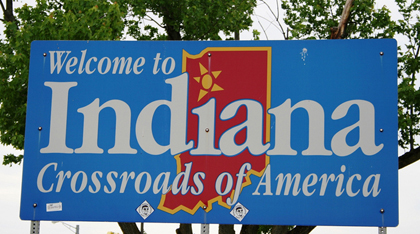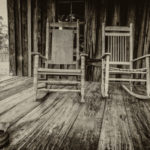
Devon, PA. If you have not encountered Eric Miller’s savage indignation elsewhere, here is a fine place to start: his review of David S. Brown’s Beyond the Frontier: The Midwestern Voice in American Historical Writing, an impressive new history of the academic historians of the Middle West, from Fredrick Jackson Turner and Charles Beard to the Jeremiah of our age, Christopher Lasch.
Brown’s monograph surveys the early- and mid-Twentieth-Century effort of historians from the Midwest to defend their region as a true apotheosis of American culture; on the flat and rolling lands stretching from western Ohio to western Iowa, Americans at their most optimistic, scrappy, independent, and temperate created a new American civilization that existed in competition and tension with the older, Eastern tradition. Such an account is invaluable for a number of reasons, the most sensational of which will be that for many Midwesterners it will come as news that they “have” any culture of their own. The comparative youth of the Midwestern settlements, their native populism and agrarian sense of the good of individual resources and communal responsibility, and their expression of the intellectual life primarily in the form of small, rural-centered liberal arts colleges, all militated against any kind of self-conscious or assertive Midwestern culture coming into being. And so, the land was ripe picking for the age of television: how much of life in the Midwest consists of receiving broadcast beams from the East and West coasts only sociologists and advertising researchers really know, but I can say from experience that it is enough to give life in flyover country the sense of being, well, flown over: a dream-like death-in-life, from which one hopes to be stirred by turning from the local news to the national, as if reality itself were located elsewhere. The effort to make this great if dry people coherent to itself was a great project that industrialization, mobility, and American corporatism both gave birth to, allowed to flourish for a spell, and then destroyed like a Walmart-bomb dropped on Main Street in Van Wert, Ohio. If we weren’t the “crossroads of America” before, we became as much in becoming the nodal target demographic for a million commercial images of goods that look absurd on the streets of Gary or on the streets of Wakarusa.
Brown captures the historical details of this project: the articulate advocacy of Midwestern populism, isolationism, and hearthstone fidelity as a model for America as a whole. Miller intervenes to tell us — rightly — that the bland conventions of contemporary academic historical writing have nothing on the works of Beard and Lasch; this is a shame, because ours is an age that calls for intelligent passion, for an effort to save the remnants of the American heartland and to make it flourish once again. Miller concludes:
Brown’s is, in short, a sobering story, taking us into the tragedy not just of American diplomacy but of America itself. These historians were right: the Middle West really did have a good thing going—it had manygood things going. Yet it found itself unable to protect its goods. What could be worse? The outrage of Beard, Williams, Lasch, Bacevich, and so many others is utterly warranted.
That’s how the story looks to this historian, at least. One of the curiosities of the book, though, is Brown’s near inability to express strong judgment on the matter. What judgments he does make certainly do not structure his narrative in direct fashion; they creep in, cautiously, gingerly, as quiet side notes. The poet and essayist Christian Wiman says there is “perhaps one definite requirement for a vital style: it must make a reader feel that something is truly at stake.” But Brown, for all of his analytic insight and narrative skill, is unfailingly—and these are the words that come instantly to mind—even-handed, impartial, objective, detached. He does not take sides—or rather, he takes all sides. The eastern cosmopolitans had their strengths, the midwestern “provincials” (his term for them) had theirs. “Lasch combined scholarship with social idealism to construct a suggestive if incomplete analysis of what ailed America,” we learn as we close out the chapter. “Taken as a whole, the earnest, uneven results remain exciting.” As the book ends, we’re brought to see that, “bowed but unvanquished, the heart of this persuasion beats on—as it must. Our sense of place, after all, has always illuminated our sense of the past.”
Surely, in the real, moral universe that we all every moment inhabit, a story such as Brown’s requires more response than this—more judgment, more extremity, more feeling, above all, more engagement. Is it really enough to drily note that since we all live in places, we can be assured that they will affect our historical and political visions? Is there really nothing else at stake? Beard would surely think so.
Make no mistake: Brown is an impressive scholar, with a sharp eye and fine narrative style. What he lacks is a professional climate that grants the freedom to write what the editor and writer Paul Elie describes as “great books,” “books we read with our lives.” “We don’t segment off some part of ourselves to read them,” Elie suggests. And yet this is precisely what the academy requires of its faithful, who must act as if the world, including the entire past of the world, can be defined and narrated on the terms of naturalistic science, with its discredited notions of objectivity, its barren empiricist epistemology, its truncated rendering of all we know to be vital and decisive—and its shrunken ability to make possible a good story about our past, much less a true story about our past.
At their best, Brown’s historians fought for ways, even within the straitened language of the modern academy, that would permit a moral vision to shape their narratives about what happened. At their weakest they became (as the example of Turner shows—he who insisted on calling himself a “social scientist”) propagators of the great secularizing movement of modernity that would narrow considerably the possibility for “great books” in the field of history, placing out of methodological and narrative reach the deepest questions of the human race itself. It goes without saying that in the absence of such books it is difficult to conceive of a great common life in any region of the modern West, let alone the Middle West.
Still, Brown’s historians knew this: that history is not an end in itself. Those who love life, and especially the way of life of their people, find ways to write histories that will call their people to it. Too much is at stake not to. We, living in these troubled times, are fortunate to have the books of these historians, who loved their place and its ways. We would do well to write our own.






6 comments
Bob Cheeks
d’Casco, dude, welcome…that poem is wonderful!
Come back, often, perhaps you’ve found your home?
d'Casco
What happened?
Well, we went into it.
On horseback, in ox-carts, afoot,
Wagon loads west went, stayed, died.
How their children stayed warm:
Inside buffalo hides, sod huts.
Where burned the peat fires now
The distillates of an old swamp
Dry the linens and our blue genes.
Few there are who recall the long drought;
Gone are the shears and blades
Who knew the songs of wild grasses.
Daddy’s gone; Mama’s goin’ –
Yes – as are we –
Was that a Ford jus’ went by?
When we came out of it
We’d been convinced that only
Our boots were wet, worn, cold.
So simple, so honest.
A great feast was had.
Look back over your shoulder
Every now & then,
And once in awhile
Just to know how, why.
How lovely is that snow
That early warning sign
Still melting here on my dock?
The bass hunting his shadows, shallows,
The red and burnt oranges of maples,
A ripple on the skin of the gray lake.
Here lies the history of man,
Here, close to the water.
An early snow, the falling leaves,
Silence so loud I shiver.
There’s cold clay beneath my feet, and
My name’s on the post near the road.
Come on in, sit by the fire.
Tell me your story.
Bob Cheeks
DW, in the great historiographical debate we have perhaps reached the final question; will we finally forget what it means to be human?
If we can not locate and explicate our humanness in the past, we can not carry it forward. We are that close to cannibalism.
But, as Voegelin has repeatedly mentioned, we create ‘second-realities,’ and destroy the transcendent in the hope of creating a narcissistic, permissive world with history standing there, smiling, waiting to tell the truth.
This revolt of modernity, against metaphysics and religion “has failed to recover the tension of existence,” and as such history and its guardians continue to explain the symbols that reveal the truth of existence, of our failings, and our successes.
Your critique of the PoMoCon strikes close to the bone.
History is a gift from God. As T.S. Eliot once wrote, “History is a pattern of timeless moments…(and) the point of intersection of the timeless with time.”
And, if history has taught us anything it is, as Voegelin noted, that the philosopher can help to make “revelation intelligible, but no more than that…”
And, for you from Bro Elliot:
” And what there is to conquer
By strength and submission, has already been discovered
Once or twice, or several times, by men whom one cannot hope
To emulate-but there is no competition-
There is only the fight to recover what has been lost
And found and lost again; and now under conditions
That seem unpropitious”
Bob Cheeks
DW, in the great historiographical debate we have perhaps reached the final question; will we finally forget what it means to human?
If we can not locate and explicate our humanness in the past, we can not carry it forward. We are that close to cannibalism.
But, as Voegelin has repeatedly mentioned, we create ‘second-realities,’ and destroy the transcendent in the hope of creating a narcissistic, permissive world with history standing there, smiling, waiting to tell the truth.
This revolt of modernity, against metaphysics and religion “has failed to recover the tension of existence,” and as such history and its guardians continue to explain the symbols that reveal the truth of existence, of our failings, and our successes.
Your critique of the PoMoCon strikes close to the bone.
History is a gift from God. As T.S. Eliot once wrote, “History is a pattern of timeless moments…(and) the point of intersection of the timeless with time.”
And, if history has taught us anything it is, as Voegelin noted, that the philosopher can help to make “revelation intelligible, but no more than that…”
And, for you from Bro Elliot:
” And what there is to conquer
By strength and submission, has already been discovered
Once or twice, or several times, by men whom one cannot hope
To emulate-but there is no competition-
There is only the fight to recover what has been lost
And found and lost again; and now under conditions
That seem unpropitious”
D.W. Sabin
A consistently stellar Bennie Devoto postulated a similar strain of thought about the contradictory motivations of the Sagebrush Rebellion states…years before there was such a toothless thing. In his essay “The West Against Itself”…he detailed at length the tendency of the Westerner to rail on about the evil and dread eastern pencil neck only to do everything in their power to hand the province over to them, lock, stock, silver, copper, lumber and barrel as long as they got their minority vig.
Cheeks, it is not as though “reality” is “lost”…..it is simply in remission. The historicides of the so called Post Modern camp view any notion of historical comparison to be both Marxist and romantically fruitless. The “POMOCON” recommends “pragmatism” and “results-oriented” actions that cut bait and run away from historical perspective in favor of “working with what one has” in order to move toward a better paradigm. This idea assumes gradual reform to be the operative agenda rather than precipitous revolution….or perhaps devolution.
Both sides of this analytical coin generally ignore the chief operating modes of humanity: the Quixotic, the Narcissist and the Gluttonous. Reality is neither static nor fixed and as soon as someone asserts they have a more practical handle on it, I generally assume they are master of all they survey because yon head is impacted up yon cloaca . Funny enough, history amply demonstrates that the school of gradualism in human advancement have a near perfect record of disaster and that the best one can hope for is occupying the niche of the muddled middle when inertial forces are in equipoise. Truly, an anomaly has been the success, up to the this precarious point….where inertia appears to be accelerating… of the American Experiment. Nothing has gone down so hard and so consistently as the Nation State and it seems to me that the POMOCON is perhaps the antipode of the character you point the Porcher as …which I believe to be too caricatured…though as usual with caricature, some grain of truth resides there.
But in the end, dismissing history is like changing lanes without a rear view mirror….one’s future comes up from behind and overruns your position as you spin out of control because the past, now future, clipped you as it went by.
Bob Cheeks
Dr. Wilson, it strikes me that as we continue on through what may be the final stages of the “…incredible spectulum of modernity” you and your associates here at FPR are engaged in no less than the effort to recapture a reality that has been lost.
What the true philosopher understands, and Hegel knew this well, is that in order to reconstitute the nature of man grounded in the truth of reality, it requires the reestablishment of a “non-existent reality” not so much through a dessicated doctrine or dogma but rather through experience.
This is not an easy challenge and the scholars here at FPR seem to be united in their turning away from the present condition in an effort to capture, through a historical analysis, an order of personal and social existence that better reflects the opportunity to engage in what is in effect a spiritual renewal, as politically incorrect as these words are.
Comments are closed.